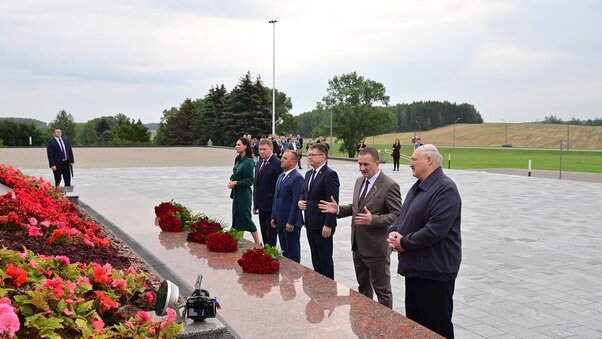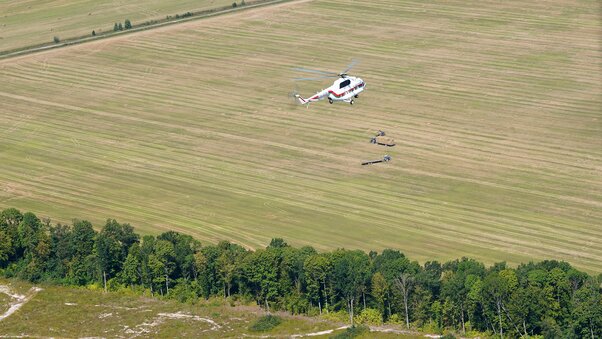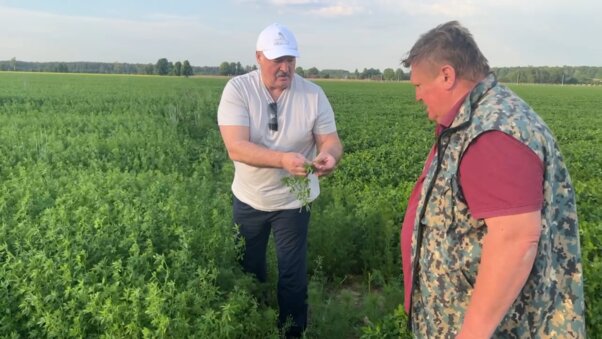Working trip to Shklov District, Mogilev Oblast
- 19
- 2
The major issue for today’s discussion is the discipline and further reforms in agriculture, Belarusian President Aleksandr Lukashenko said during his working trip to Shklov District on 9 August.
The head of state convened a meeting in Shklov to discuss effective development of agricultural production in Shklov District and Orsha Districts. Aleksandr Lukashenko said at the very beginning of the meeting that the issue would be considered on a nationwide scale. “Our today's topic for discussion is discipline and reforms in agriculture,” the President said.
According to him, attention should also be paid to the role heads of district executive committees play. It is about the legal and regulatory framework of their activities and a clear understanding of their powers and range of issues. “I believe there are questions to us. To me,” Aleksandr Lukashenko said.
According to the head of state, there is actually no legal act on chairpersons of district executive committees or oblast executive committees, which would clearly explain the relevant issues for everyone. “We need a document that will describe [officials’] powers and functions,” the President said.
He added that such a document would rule out any disputes over departmental subordination and limits of competence.
During the meeting, Aleksandr Lukashenko emphasized the need to address a very important issue - to decide on the methods of improving the efficiency of agricultural production in the two gross-forming districts.
t first, the discussion focused on Orsha. The region received an impetus for development in late 2018, when the President signed Decree No.506 “On the development of Orsha District” with a view to improving people’s living standards.
A five-year accelerated development program was adopted to cover almost all areas of production and social sector. “The project is exemplary. We used the program-targeted method. We have determined the elements of integration,” Aleksandr Lukashenko said.
According to the President, all necessary resources have been allocated and over Br1 billion has been invested in the agro-industrial complex of Orsha District. “The district got a new lease of life. Salaries have been increased. The outflow of personnel has slowed down,” the head of state pointed out.
Shortcomings were also mentioned. Not all the activities envisaged by the program have been implemented. A number of production and financial targets have not been achieved. In particular, the district failed to reach the targets on cereals and flax. New processing capacities remained underutilized. A number of farms still do not have enough cattle.
“I think you will have to work hard to bring this program to its successful conclusion,” Aleksandr Lukashenko said.
Speaking about Shklov District, the President touched upon integration processes underway in the region. There are 10 farms in the district, although there were about 30 of them in Soviet times. “The task of the head of the district executive committee is to establish good relations with the heads of these ten farms and work, help each other,” Aleksandr Lukashenko instructed.
The largest farms in the district are Kupalovskoye and the enterprises of the Belarus President Property Management Directorate - Aleksandriyskoye and ASB-Agro Gorodets.
The head of state recalled that orders to get things in order in Kupalovskoye, which in addition to the management company also unites three other agricultural enterprises, were given just over five years ago. “I know that there were a lot of controllers and inspectors here, but the systemic problems remained in place,” he noted.
Some growth in gross output, milk and cattle has been registered in 2024. More haylage and grass fodder has been harvested. It is however worth taking a look at their quality, not only at the results on paper, the President said. After all, even with such results, cattle death losses in all farms of the holding company have almost doubled. There is a personnel shortage. There are not enough veterinary specialists. Debts are piling up.
“You failed to get back in the black following the first stage we outlined then. There is a decent base there,” the head of state concluded.
As for Aleksandriyskoye, the President said that a lot of resources have been invested in the enterprise (almost Br40 million to repay investment loans, purchase grain, fertilizers and for other needs). The problems remain virtually the same as at Kupalovskoye: reduction of poultry stock, reduction of egg production, increase in cattle mortality.
Meanwhile, the region has preserved a high culture of soil cultivation since the Soviet times – not all the western regions can boast such a level of cultivation. In this regard, the head of state reasonably criticized the leaders of Mogilev Oblast and Minsk Oblast: “Isachenko's fields are not plowed properly. The same is true for the areas of the Minsk Oblast governor - from Borisov to the Berezinsky Biosphere Reserve. The fields are empty there. Leonid Konstantinovich [Zayats], the question is whether we do anything with land reclamation. They do not plow the fields that should be plowed today, which means we are expanding land for reclamation and losing the same amount of hectares that should be plowed without on the land that needs no reclamation.”
The President instructed the heads of the oblast and district executive committees to have all necessary lands plowed.
Returning to the issue about the development of Aleksandriyskoye Aleksandr Lukashenko recalled his instructions to the Belarus President Property Management Directorate to team up with scientists and work out a clear and understandable concept of further development.
“It should be a concrete, and most importantly, realistic plan of measures. It needs technological maps, elaborated tasks, a detailed forecast on the prospects for each field and processing facility,” the President said.
According to the head of state, all heads of agricultural enterprises of Orsha and Shklov districts have been specially invited to participate in the meeting. “It is necessary to discuss everything in detail and make final decisions,” Aleksandr Lukashenko said.
The President warned against any mistakes in the implementation of the measures: “It is a huge amount of money, and we have no extra money.” According to the head of state, Orsha District, for example, has agricultural complexes, the experience of which can and should be expanded across this district and Shklov District.
“It is necessary to go in this direction. We have already exhausted what was on the surface and brought $8 billion in exports a year. This is a lot of money, no other industry gives so much. All this has been exhausted, and we need to introduce technologies now. Technological and executive discipline is the main thing. If we do not have it, any investment will be a waste of money. Therefore, before you ask for money, address banks, the government, and especially me, first prove that every ruble you invest will come back tenfold,” Aleksandr Lukashenko said.
The head of state emphasized a number of fundamentally important aspects.


